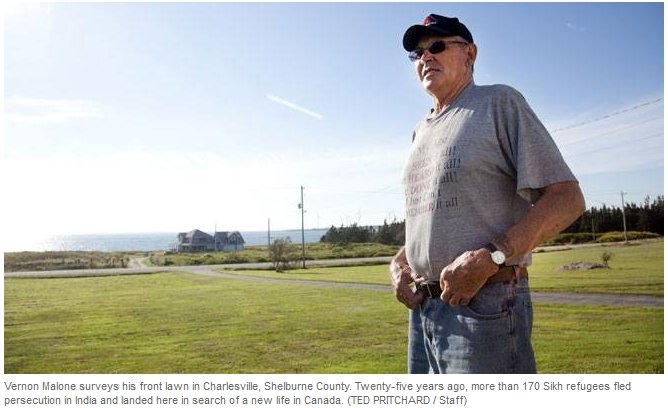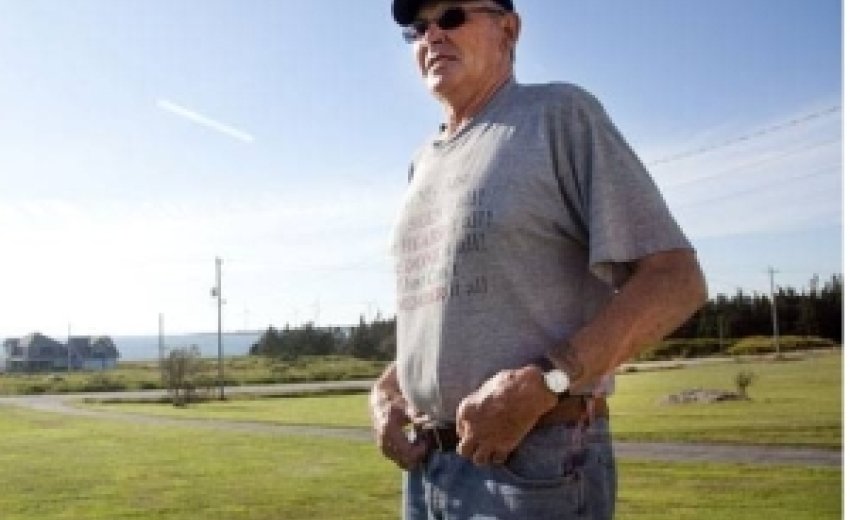25 years ago this summer, 174 exhausted, confused Sikhs landed on the shores of Shelburne County, seeking refuge in Canada

Editor's note: This is the first in a two-part series on the problem of smuggling in Nova Scotia. In tomorrow's paper, we profile the officers who patrol our shores and look back on two major incidents of human smuggling.
September 4, 2012: Vernon Malone was definitely multi-tasking on a foggy July morning in 1987 as he slapped a cassette tape into his new camcorder while at the same time pulling up his trousers.
Canada’s newest batch of refugees — 174 Sikhs from India — were standing on Highway 3 in front of Malone’s Charlesville home in Shelburne County.
They appeared tired and perplexed. Some apparently thought Toronto was not far away.
The Sikhs came on a ship from Germany that had dropped them off. They said they were from the Punjab. They were fed peanut butter and jelly sandwiches and Kool-Aid at the nearby Woods Harbour firehall by local residents, who swarmed out of their homes to welcome the refugees.
Malone lives alone today, in the same house near the mouth of Pubnico Harbour where the Sikhs were put ashore.
He recalled recently what happened on that day 25 years ago.
Malone had come in from a swordfishing trip the night before with his son Tim.
He fished out of East Pubnico.
Malone got home by 7 p.m. He was dog-tired, he recalled, as his wife asked him if he’d heard about the refugees who were being sought offshore. It had been on the news.
Malone hadn’t heard much and he went to bed.
Malone slept soundly until he was jarred awake by the jangling of the telephone at 4:45 a.m.
It was Tim calling from next door.
“He said, ‘Dad, did you hear about the refugees that were supposed to land?’”
Malone replied groggily that he’d not heard much.
“Well,” said Tim, “they’re out on the highway.”
“I was still just waking up and I said, ‘Out on the highway?’
“He said, ‘Yes, don’t put on the light!’
“So I jumped out of bed.”
Malone had purchased a video camera because they were all the rage. They were kind of novel in those days.
He burst through his door and began filming.
Although it was dark and the fog was thick, the area was illuminated as folks began to arrive.
“The RCMP came. There (were) car headlights and I got pretty good videos.
“I said, ‘You gotta get these people off the highway because they’re going to be killed. There’s fish trucks going back and forth early in the morning,’” Malone told the authorities.
“Some (migrants) could talk English. So I said ‘Follow me’ ’cause I wanted to get them off the highway.
“Well, they just all followed me 174, I think.”
They all walked up to the lawn of his son’s home.
“There was one woman. As far as I know she was from Turkey,” said Malone.
The men were relieving themselves anywhere they could, peeing in the bushes and on the lawn.
Malone told the woman she was welcome to use the facilities in his home.
But police soon appeared at his front and back doors.
“They thought I was trying to hide this woman but I wasn’t,” he said.
The migrants were bone-tired and very thirsty as they milled about on the lawns of homes.
They had landed at a place the locals called The Bluff.
“They had to get wet and some had scars (cuts) on their legs.
“They didn’t know where they were. They didn’t know what to do. They didn’t have a clue. They had been 17 days on the ocean,” said Malone.
So they started walking.
The Sikhs were soon bused to Halifax.
Before that, locals came and fed them.
“All of the people came and brought food. Anything that they could bring,” said Malone.
Crackers and wieners and bread all appeared for the new arrivals to eat as people came from Woods Harbour and Charlesville.
“All of the people were involved,” said Malone.
The Sikhs who stepped ashore here were arriving from a troubled homeland, for sure.
In the northern Indian state of Punjab, there was an attack on the Golden Temple, a sacred Sikh site. A holy place, said Jagpal Tiwana, president of the Maritime Sikh Society.
A clash took place in 1984 between the government and an armed group of Sikh separatists who took shelter in the Golden Temple.
“So government attacked that temple to flush them out,” recalled Tiwana, who lives in Dartmouth.
Sikhs were incensed and said other options could have been tried instead of storming their sacred temple.
Violence erupted and then-Indian prime minister Indira Gandhi was killed by her Sikh bodyguards.
“They were emotionally charged at that time,” Tiwana said of the two Sikhs who assassinated the prime minister.
Things got out of control and widespread persecution broke out against Sikhs, he said.
“Sikhs were killed like flies.”
Government troops did little to stop the mayhem, he said.
The Sikhs who landed in southwestern Nova Scotia less than two years later fled from the turmoil in that region and chose Canada as their final destination.
“Canada has a very good reputation. Here, there is much more tolerance for minorities. It has a very good image in the world,” said Tiwana, who helped the migrants once they arrived.
“There are a lot of Sikhs in Canada and they know how nice, how tolerant a country it is.”
Tiwana himself came in 1969 with his wife. He was a librarian at the Nova Scotia Teachers College in Truro. He’s 76 now and retired.
When the migrants came ashore in Shelburne County before daybreak, they were well received.
“That impressed us most,” said Tiwana.
“They thought, ‘They are hungry. They are human beings,’” Tiwana said about the local residents of Charlesville and Woods Harbour who came out to help.
“So they took them to the firehall and offered them juice and (food). They helped us very, very much. We are very thankful to them.”
In the intervening years, the migrants stayed in Canada and established themselves, mostly in Ontario and British Columbia.
“They don’t go on welfare. They try their best to get a job and they have really made a lot of progress,” said Tiwana, who knows some of them.
“They are very happy here. They have good houses. Good businesses. They are very well settled.”
Some married and brought family members over to Canada, he said, and at least one married a Canadian woman.
